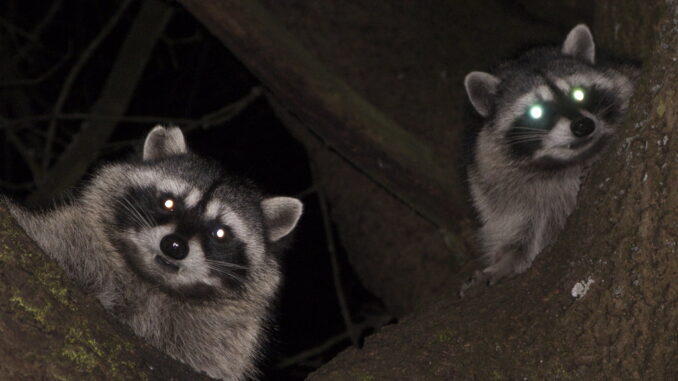
Are raccoons dangerous at night? Raccoons are not inherently aggressive towards humans, but being nocturnal hunters (meaning they are most active at night) in search of food, they may pose a threat to pets. They might exhibit defensive behavior if they feel threatened, especially if cornered or protecting their young.
Let’s delve into the dynamics of raccoon behavior at night and how to approach their presence with awareness.
Table of Contents
Are raccoons dangerous at night?
Raccoons are generally not considered dangerous to humans at night unless provoked. They are nocturnal animals and are more active during the night, often hunting for food. While they may not directly attack humans without cause, conflicts can arise if a pet, especially a dog, reacts aggressively to the presence of a raccoon. In such situations, the encounter may escalate, posing a potential risk.
Additionally, raccoons are notorious for raiding trash cans and may disrupt gardens, creating a disturbance. Their opportunistic nature makes them potentially harmful to various animals in their vicinity, including cats, dogs, squirrels, rabbits, snakes, and even aquatic animals like fish and turtles if there’s an open stream nearby.
It’s essential to exercise caution and take preventive measures to avoid conflicts with raccoons, especially during the night.
Why are raccoons dangerous at night
- Nocturnal Nature: Raccoons are nocturnal animals, making them more active and potentially encountering humans during nighttime hours.
- Hunting Instincts: Seeking food sources at night, raccoons may come into conflict with humans or pets, especially if they feel threatened or cornered.
- Defensive Behavior: While not inherently aggressive, raccoons can display defensive behavior, especially when protecting their young or territory.
- Pet Attacks: Raccoons may attack pets if they perceive them as a threat or competition for food, leading to potential conflicts in residential areas.
Key Dangerous of Raccoons at Night
- Aggressive Behavior: Raccoons may display aggression if they feel threatened, cornered, or are protecting their young, potentially leading to bites or scratches.
- Disease Transmission: Raccoons can carry diseases, such as rabies, which pose a risk to humans and pets through bites or scratches.
- Pet Conflicts: Raccoons may engage in conflicts with pets over food or territory, potentially resulting in harm to the pets.
- Property Damage: In search of food, raccoons may cause damage to property, including tearing into trash bins or creating entry points into homes.
How to be safe from dangerous raccoons?
- Secure Trash Bins: Keep trash bins tightly sealed to discourage raccoons from scavenging for food in residential areas. Read the full guide on keeping raccoons out of trash.
- Remove Outdoor Food Sources: Eliminate potential food sources in outdoor spaces to reduce the attraction for raccoons.
- Secure Pet Areas: Keep pets indoors at night, or if they are outside, ensure they are in secure and enclosed spaces to avoid potential conflicts with raccoons.
- Seal Entry Points: Close off entry points to homes, sheds, or other structures to prevent raccoons from entering and seeking shelter.
- Avoid Direct Confrontation: If you encounter a raccoon, give it space and avoid cornering it, as they may become defensive if they feel threatened.
- Install Motion-Activated Lights: Illuminate outdoor areas with motion-activated lights to deter raccoons and make them less comfortable in the vicinity.
- Vaccinate Pets: Ensure that pets are up-to-date on vaccinations, especially for diseases like rabies, to mitigate potential health risks in case of an encounter.
Frequently Asked Questions (FAQs) About Dangers of Raccoons at Night
Q1: Are raccoons dangerous to humans?
A: Raccoons generally do not attack humans, but they can be potentially dangerous if they feel threatened, provoked, or perceive a risk to their young. In such situations, raccoons may exhibit defensive behaviors that could pose a risk to human safety. Caution and avoidance are recommended to prevent conflicts.
Q2: Are raccoons dangerous during the day?
A:Raccoons are generally considered less dangerous during the day as they are primarily nocturnal creatures. They prefer to avoid daylight and may exhibit less aggression during daytime hours. However, caution should still be exercised, especially in urban areas where they may adapt to more day time activity.
Q3: Is a raccoon sleeping in the open during the night dangerous to humans and pets?
A: Generally, a raccoon sleeping in the open poses minimal danger to humans and pets. However, caution should be exercised, especially if the raccoon feels threatened or provoked, as defensive behaviors may arise.
Q4: What are some potentially dangerous behaviors exhibited by raccoons?
A: Raccoons may exhibit dangerous behaviors, including biting and scratching, which can lead to the transmission of diseases. They may also pose a threat to pets through conflicts, and in extreme cases, such confrontations could result in harm or even death to the pets involved.
Conclusion:
While raccoons are fascinating nocturnal creatures, they can pose potential risks to humans, pets, and property. Their adaptability to urban environments increases the likelihood of interactions. Though raccoons are not inherently aggressive, defensive behaviors may arise, especially if they feel threatened or are protecting their young. Preventive measures, such as securing trash bins, removing outdoor food sources, and avoiding direct confrontations, are essential for coexisting safely.
